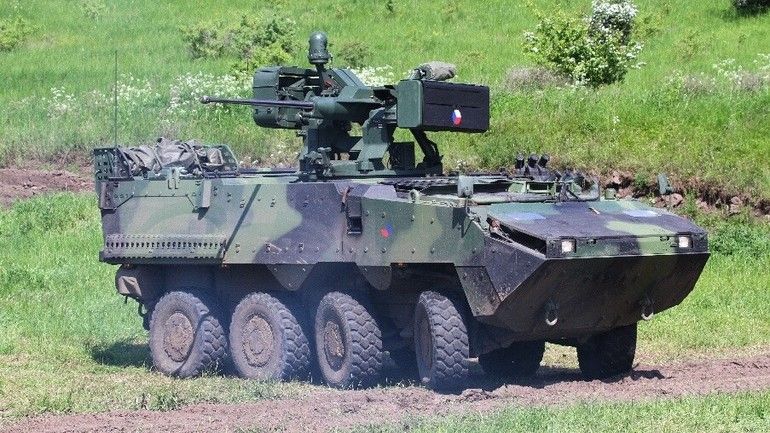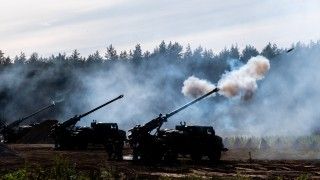- WYWIADY
- WIADOMOŚCI
“A Great political decoration...and nothing beyond that”. Czech Minister Criticizes The Polish Policy Within The V4 Group.
Poland is trying to start certain initiatives, and to spend certain money. Programmes are being planned. However, Poland does it independently, without looking for any partners. (…) As if the Polish authorities thought that initiative is enough to make things happen. The world does not work that way – as Daniel Kostoval, Head of the Armaments and Acquisition Division Ministry of Defence of the Czech Republic, stated in his interview for Defence24.com. The interview covers the issue of an initiative, the aim of which is to design a joint infantry fighting vehicle for the V4 group, or the modernization plans pursued by the Czech Army, including the air-defence initiatives.

Juliusz Sabak: What did you mean, when during the “Improving Dialogue on Defence and Security in Europe—the Regional Perspective” panel, which took place during the Warsaw Security Forum, you said that you would like Poland to be more extrovert in its activities undertaken within the Visegrad Group?
Daniel Kostoval, Czech Deputy Minister of Defence: When I said that “Poland should be more extrovert”, I referred to the activities undertaken by Warsaw throughout the last two years, within the Visegrad Group. These activities were too introvert.
Can you elaborate on that thought?
Let’s take some initiatives that should be realized jointly – for example the joint project of an infantry fighting vehicle. We have received a document, with a very short notice and then…silence…for six, seven months. We could only guess, what the real message was. The document was very, very general. What are the meanings of this or that declaration, contained in the document? We had to guess.
Lack of sufficient communication at the governmental level?
Unfortunately yes. By “more extrovert approach” I mean that, if Poland is the aspiring regional leader, then the country should make investments in that leadership. Send its people to Prague, or to other European capital cities. Talk, ask, ask for comments on different issues. Organize meetings. Political meetings and working meetings. Poland should maintain permanent presence in the region. In the region’s politics.
And this does not happen?
Unfortunately no, this does not happen. Poland is trying to start certain initiatives, and to spend certain money. Programmes are being planned. However, these programmes are being planned independently, without communication with other countries. Without looking for any partners. Today, actually the Czech republic generates more actions in the V4 group, proposing more joint initiatives.
This is the word of mouth among my friends and partners in Poland. They say, that Poland is very introvert. A lot of internal discussions, analyses, plans are being executed. However, little of the above appears on the surface abroad. As if the Polish authorities thought that initiative is enough to make things happen. The world, particularly in the area of international security, does not work that way.
It is not enough to announce that you want something.
This is what I mean, stating that Poland’s stance shall be more extrovert, because – in fact – if you want to get some effect, you have to live it. Think about it on a daily basis – what should I do to make it happen. This stance I cannot see in the Polish government or the Polish Ministry of Defence.
I often feel that Polish policy is only a great political decoration...and nothing beyond that.
I agree here – Poland needs to be more “interactive” to achieve its goals. Today, our message is “come with us”, however we do not mention the direction, or the way which is to be taken, within the V4 framework. Does it sound familiar, does it remind you of the joint infantry fighting vehicle programme mentioned earlier? Polish Deputy Minister of Defence, Czesław Mroczek, back in May 2014, talked a lot about a plan of joint acquisition of the infantry fighting vehicles, which was to be realized together by Poland, Czech Republic, Slovakia and Hungary.
In case of the infantry fighting vehicles, we would like the project to be accelerated. In fact, we need ca. 2 years more, in order to analyse the options and select the specific product. In this area, we try to be in touch with Poland. Actually, your Ministry of Defence is interested in a joint solution. The problem is placed in the question whether the Polish industry is willing to manufacture the IFV on its own, or whether the industry is going to look for external partners, forming an industrial alliance. For example, a Czech-Polish alliance. In order to do that, we need to create joint military and technical requirements, so that we are able to order the product from our industries.
And how do you assess the actions taken by Poland, within the scope of the joint IFV programme? Is it also an area, within which many declarations have been made by the Polish government, without any reflection in the undertaken actions?
Within the international dimension, this project has been discussed for years now. At this level, we have been able to – let’s name it – motivate the companies to be engaged in a dialogue, which would lead us towards a possible, joint solution. I, personally, wait for some effect of the dialogue between the companies. I hope that I am going to see the initial results before the end of this year.
So, finding a joint solution is going to take some time. Are there any discrepancies, between the stances taken?
Part of the debate between the Czech Republic and Poland is covering the issue, whether a joint platform should be designed from scratch, or whether we should use so called “sufficiently modern existing product” and tailor it to our requirements. We prefer the latter solution. Meanwhile, and this stems from insufficiently “extrovert” stance, it seems that Poland is playful, when it comes to the idea of creating something on its own. Such option is being considered. We are convinced that spending money on research and development is not justified, since sufficiently modern designs are readily available on the market. We would rather obtain a joint solution based on an existing and proven platform.
What is the timeline, when it comes to acquisition of the aforementioned infantry fighting vehicles, for the Czech Army?
The deadlines are a result of the economic capacity and of the general development plan. Czech Republic currently has two brigades at its disposal - light one and heavy one. The former one uses the Pandur vehicles and other wheeled vehicles. It is going to be fully modernized and staffed. In case of that unit, there is still a need to replace half of the vehicles with their modern counterparts.
Later, modernization of the latter, heavy brigade is going to be carried out. This unit is armed with infantry fighting vehicles. Due to the fact that our budget is going to be gradually increased in the upcoming years, sufficient funds, required to realize procurement of the successor for the BVP-2 IFV, are going to become available in 2019-2020. Then, we may think about signing a contract and starting the procurement process. We are also in need of replacing our tanks. We also want to withdraw the KUB missile system, acquiring a medium range air defence system. However, we will start the process with acquisition of new, mobile air defence radars.
If I understand this correctly – purchases are going to be started with 10 air defence radars and then you will decide on the air defence system. What is the timeline for this procurement project?
We would like to sign the radar-related contract in mid-2016, with the first deliveries happening between 2017 and 2018. These radars have to be capable of being integrated with the future air defence system. We are going to add further elements to the system. Thus, we are looking for solutions which not only will provide us with a radar that would be capable of detection, but also a radar which could be used to guide the missiles. This is just the first step.
Polish Ministry of Defence is currently working on acquisition of a modern medium range air defence system. When is Prague planning to make that step?
We have just began serious analyses related to the options available, including the alternative solutions. We are analysing the Polish and German steps taken within that area. We are looking at the plans made by Hungary or Slovakia. Our system should be compatible and it should have a proper level of interoperability with the systems used by the neighbouring nations. However, this is a decision which will be taken in the future.
All of your statements suggest that the Czech Republic has a coherent, long-term plan, not only when it comes to its armed forces, but also within the scope of the industry. This can bee seen in the decisions, that are being made. Including those related to acquisition of equipment and armament for EUR 45 million. A large portion of the above amount has been allocated to the contract, the aim of which is to acquire more than 2.6 thousand CZ 805 BREN rifles. Does it mean that Post-Soviet weaponry is going to be transferred to the reserve units?
New Brens are going to be delivered for the active reserves and for the regular units. For these elements, we needed more NATO-standards-compliant rifles, hence acquisition of another lot of these weapons. Our old “Czech Kalashnikovs” (old vz. 58 rifles – editing team’s addendum) are going to constitute the armament of the mobilized reserves. Part of these weapons is going to be delivered for the Kurdish army, since their caliber is still very popular there. For us, these weapons are obsolete. It is going to be gradually decommissioned, until we get rid of all of the examples from our inventory, and replace them. Similar plans are related to the remaining types of the post-Soviet armament.
Thank you for the conversation.















